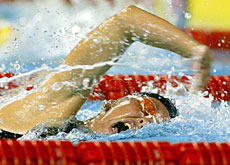Anti-doping chief backs tough line on drug cheats

The Swiss Olympic Association has supported a decision by Zurich’s Weltklasse athletics meeting not to invite triple Olympic champion Marion Jones, who is under investigation for doping.
In an interview with swissinfo, Oliver Hintz, head of the association’s anti-doping commission, says the fight against drugs must continue.
The run-up to the Olympic Games in Athens, which get underway in a week’s time, has been marred by doping allegations.
The United States Anti-Doping Agency (Usada) is investigating a number of high-profile athletes in the US, including Jones, who has been selected for Athens.
Last week the organisers of Friday’s Weltklasse said Jones was not welcome in Zurich.
swissinfo: Do you think it was the correct decision not to invite Marion Jones to the Weltklasse?
Oliver Hintz: I must say that I understand the decision by the organisers of the Weltklasse Zurich, because we have heard so much about the Jones case.
There are only rumours at the moment but I’m convinced there wouldn’t be any rumours if Usada didn’t have facts on the table.
swissinfo: Should she still be going to the Olympics under this cloud of suspicion?
O.H.: That’s a decision she has to make for herself. She says she’s innocent and that she’s going to Athens, which is not surprising.
But if I was her, I wouldn’t go. The Olympic Games are not just like a World Championships, there is much more at stake, the Olympic spirit and so on.
Athletes who are under this kind of suspicion should say to themselves that the Games shouldn’t be overshadowed in this way.
swissinfo: Here we are at another Olympic Games and people are talking about doping, especially in the US. Are you surprised by what’s been going on there?
O.H.: No, I’m not. When the THG [steroid] scandal broke last year I spoke to Terry Madden, the chief executive of Usada, and he told me then that there would be quite a lot of cases arising.
We know that over the past ten or 20 years the Americans haven’t really had an anti-doping policy; with Usada, they have.
swissinfo: Would you say that doping has been taken more seriously in Switzerland?
O.H.: That’s absolutely the case. Since 1999 we have had an independent organ, the anti-doping commission, within the Swiss Olympic Association. Over the past eight years the competences in anti-doping have also moved from the individual sports federations to the Swiss Olympic Association.
We have also signed and implemented the Wada [World Anti-Doping Agency] code and we participate in the IADA [International Anti-Doping Arrangement]. I am convinced that Switzerland is one of the 15 best countries worldwide in terms of anti-doping procedures.
swissinfo: How foolproof are these procedures. Can you say that every member of the Swiss team going to Athens is clean?
O.H.: You can never say that because tests are only a spot check. We are doing around 1,900 tests a year and it’s not possible to test each athlete four or five times a year, as should be the case, because resources are limited.
But you will have athletes who have been tested maybe ten times and others, who are on a different level, who haven’t been tested at all.
What’s clear is that every athlete who’s going to Athens has been tested quite a lot. We have carried out around 400 tests and there are nearly 100 athletes in the team.
swissinfo: What about gene doping. How much of a threat does that pose?
O.H.: At the moment we think it is not a problem, but we know that it could be a big, big problem in a few years. When these methods reach clinical use, there is no doubt that there will be athletes who would like to use them.
Scientists researching gene therapy preventing muscle waste say they have already had inquiries from athletes.
swissinfo: Should IOC members that don’t sign up to the Wada code on performance-enhancing drugs be banned from the Games?
O.H.: It must be that way. They should not be allowed to take part in the Olympic Games or the World Championships, and they should not be allowed to host these kinds of competitions. It’s essential there should be pressure to sign.
swissinfo: Do you sometimes look at a race and think he or she looks like they’ve been taking steroids?
O.H.: Yes, I do. But years ago when I thought that, I was not sure whether they would be caught or not.
Today, I know there’s a strong possibility they’ll be caught if they are doped.
swissinfo-interview: Adam Beaumont
The Swiss Olympic Association says the tough line taken by anti-doping bodies is beginning to pay dividends.
The organisation says stricter international regulations are making it harder for cheats to slip through the net.
While new drugs pose a serious threat, Swiss anti-doping experts say testing procedures are steadily improving.

In compliance with the JTI standards
More: SWI swissinfo.ch certified by the Journalism Trust Initiative










You can find an overview of ongoing debates with our journalists here . Please join us!
If you want to start a conversation about a topic raised in this article or want to report factual errors, email us at english@swissinfo.ch.